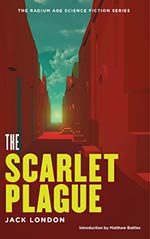
![]() Badseedgirl
Badseedgirl
6/26/2021
![]()
I read this novella free courtesy of the Gutenberg Project. It is available here: https://www.gutenberg.org/files/21970...
I have never read The Call of the Wild. I have never really felt the urge, but I stumbled upon this book while cruising the Gutenberg Project and I thought "Why not?"
Every time I read a story from this time period (Jack London wrote this story in 1910, and it was first published in 1912) was that it is easy to see why communism, socialism, and other political beliefs adherent to capitalism started to flourish. The working class was described as brutal, sloven, drunkenly, barbaric, undeserving of respect or human dignity. And this was the highest achievement of mankind, the protagonist discussed it when he meets people again, after years of hiding, thinking he was the last man on earth. In the following passage he describes meeting the Bill Chauffeur and his "wife" Vesta Van Warden.
"And so I say to you that you cannot understand the awfulness of the situation. The Chauffeur was a servant, understand, a servant. And he cringed, with bowed head, to such as she. She was a lord of life, both by birth and by marriage. The destinies of millions, such as he, she carried in the hollow of her pink-white hand. And, in the days before the plague, the slightest contact with such as he would have been pollution. Oh, I have seen it. Once, I remember, there was Mrs. Goldwin, wife of one of the great magnates. It was on a landing stage, just as she was embarking in her private dirigible, that she dropped her parasol. A servant picked it up and made the mistake of handing it to her--to her, one of the greatest royal ladies of the land! She shrank back, as though he were a leper, and indicated her secretary to receive it. Also, she ordered her secretary to ascertain the creature's name and to see that he was immediately discharged from service. And such a woman was Vesta Van Warden."
Now I am nor saying Bill Chauffer was a prince, in fact he beat Vesta, and possibly killed her according to our protagonist. But if I had spent my life beaten down and fearful of retribution for the act of handing a dropped object to someone of a higher station, I might be tempted to "get a little back" given the opportunity. I found the protagonist, Professor James Howard Smith to be as unlikable character as the rest of the characters in the story for this reason.
I have to wonder if society would be so diminished in the event of catastrophic plague. In the 60 years since, Professor Smith's grandchildren barely speak in any language, are dressed in fur, and have lost the ability to read or write. I'm not really blaming these kids for being awful people, I blame their parents and grandparents. There would have been books and literature on how to rebuild basics like steam powered machines and farming and husbandry techniques. The domesticated animals were there for re-domestication. This is like the "worst case scenario" if everyone left was too stupid to try and rebuild.
At first I thought "well, you did not feel this way about the movie Threads when you saw it." but I do not think it is an accurate comparison, because everything is still just sitting around. A more apt comparison would be to Stephen King's novel The Stand.
Apparently this story had a resurgence in popularity in 2020 due to COVID (Of course, what else. Everything in 2020 was because of COVID.) https://www.baltimoresun.com/opinion/... And as usual, I am late to the game.
The story itself was interesting because it tried to tie in the modern scientific theories according to what was known at the time it was written, and discussed the psychological and post traumatic aspect of seeing 99.99% of the population die in a pretty horrifying way. It also ends on a bit of a bummer note, because the narrator sees a future where humanity rebuilds, but will ultimately be destroyed by its own nature.
https://www.goodreads.com/badseedgirl